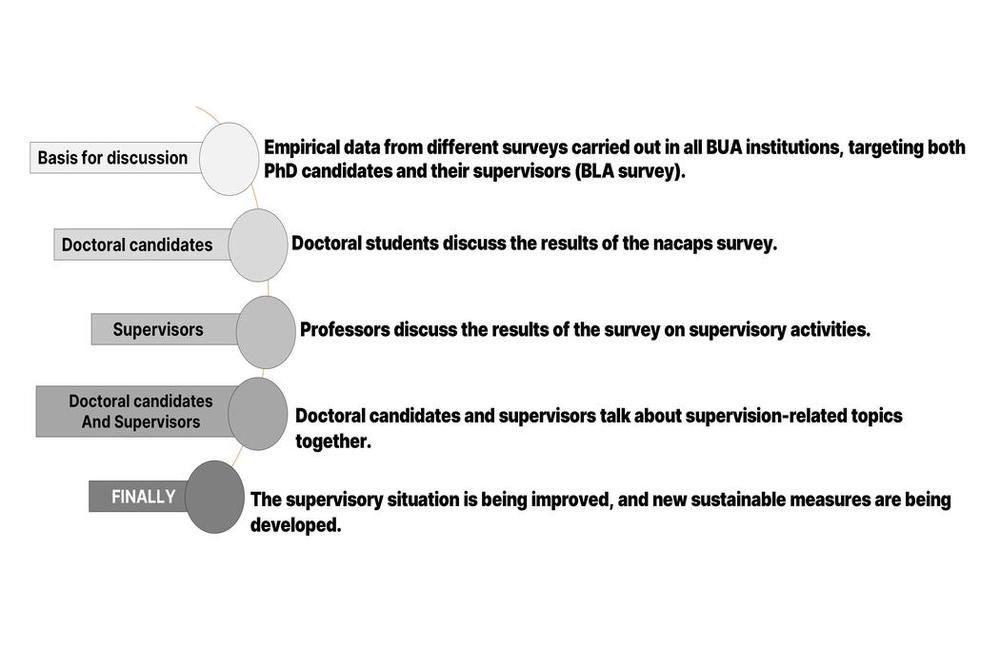Good Supervision Culture
The supervisory relationship represents a crucial element in the successful completion of a doctoral project.
But what exactly is good supervision? What does it mean? How can it be defined and evaluated?
The “Good Supervision Culture” project aims to foster discussion about the supervision process, with the goal of harmonising and improving doctoral conditions across all BUA institutions.
A Multistep Approach to Dialogue
“It is important to have conversation in an open-minded atmosphere.”
— Participant, Discussion Round
Through a multistep approach, all members of the target group – both doctoral candidates (R1) and supervisors – were invited to exchange their perspectives on the topic of supervision in a data-based and open-minded environment (see Fig. 1).
The discussion topics were developed on the basis of empirical data and direct feedback from both groups.
They draw on findings from the nacaps – National Academics Panel Study, on feedback and suggestions from doctoral candidates, and on a survey of professors’ opinions about supervision conducted by the Berlin Leadership Academy (BLA).
Building on these insights, an expert group was established during the implementation of the project to ensure its long-term impact and sustainability.
This includes new measures such as revised (or newly developed) supervision guidelines, an interactive tool, and a series of videos designed for doctoral candidates and those considering starting a doctorate.
Empirical Basis and Discussion Process
The project is based on empirical data collected across all four BUA institutions and aims to connect insights from both doctoral candidates and supervisors.
The following steps illustrate the structure of the dialogue process:
- Doctoral candidates discussed the results of the Nacaps survey and shared experiences and expectations of good supervision.
- Supervisors reflected on findings from the BLA survey on supervisory activities and their own practices.
- Joint discussion rounds brought both groups together to exchange perspectives and define shared principles of good supervision.
These multilevel discussions provided a foundation for improving the supervision landscape and identifying sustainable measures.
Survey Insights (Berlin Leadership Academy 2024)
In 2024, the Berlin Leadership Academy conducted a comprehensive survey among professors from all BUA institutions to gain insight into the work and challenges of doctoral supervisors.
The results were analysed and presented to all institutions as part of the discussion rounds.
On average, supervisors reported that they:
- Supervise 7.15 doctoral candidates as main supervisors
- Have supervision agreements with 5.13 of them
- Review those agreements approximately once per year
- Spend around 5.5 hours per week on supervision
- Feel confident and well-prepared for their role (mean = 4.32 on a 5-point scale)
These findings, combined with feedback from doctoral candidates and results from Nacaps, served as the empirical foundation for the discussion process.
Results and Achievements
Summarizing the project outcomes:
- 4 BUA institutions analysed supervision-related data and created an expert group
- 17 discussion rounds with over 100 participants were organised
- 149 professors took part in the BLA supervision survey
- 1 interactive tool and 1 video for doctoral candidates were developed and produced
- 1 comprehensive report documenting the project has been completed
The establishment of the expert group ensures the long-term continuity and implementation of project results.
This group continues to work on developing new measures such as updated supervision guidelines, digital tools, and formats to further strengthen the supervision culture across the BUA.
Looking Ahead
The initiative will conclude with a final event in December 2025, offering an opportunity to meet experts and exchange perspectives on the future of good supervision.
From our perspective, this project has been successful in two key respects:
- It has raised awareness of the importance of supervision across all BUA institutions and led to the implementation of new measures.
- It has provided a valuable platform for mutual learning and collaboration, contributing to the ongoing enhancement of doctoral supervision practices in Berlin.
Contact
Dr. Simone Bartsch, program manager
Technische Universität Berlin
E: promoting-talent@berlin-university-alliance.de


